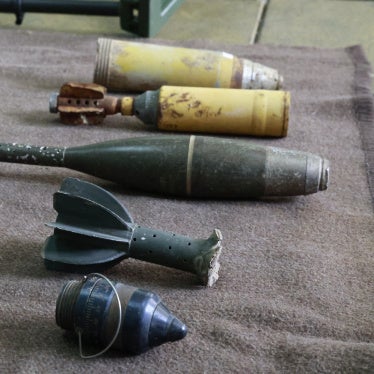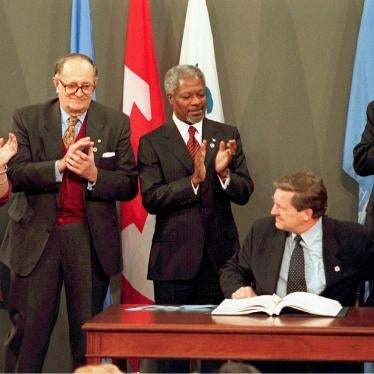Co-chairs, representatives of all the States Parties, we most regrettably feel that we must sound the alarm bells. There are far too many serious compliance concerns piling up. We urge all States Parties to do their duty and urgently confront compliance issues. Non-compliance directly corresponds to a weakened humanitarian impact of the treaty.
Most disturbingly, in an unprecedented situation, we have serious allegations of use of antipersonnel mines by the armed forces of at least three States Parties: Sudan and Yemen recently, plus the ongoing investigations and legal proceedings in Turkey.
There have been repeated reports in 2011 and 2012 of new mine use in Sudan by both government and rebel forces. Based on concerns expressed by UN personnel, and information gathered on the ground, including photographs, the allegations are serious and merit careful investigation and finding of facts. Sudan did not respond to our earlier public calls to address these allegations, but just yesterday it replied to a letter of inquiry from the ICBL dated 8 March and indicated that it would conduct an investigation. And on Tuesday of this week, following a Human Rights Watch briefing on the use allegations, the Sudan delegation here stated that Sudan would in fact investigate the allegations.
In Yemen, PPM-2 antipersonnel mines were laid at the Ministry of Industry building in Sana’a in 2011. These mines caused at least one civilian casualty in 2012 and there is video evidence of clearance activity there in 2012. It cannot be conclusively determined what forces laid the mines, but the timeline of events points to government forces, and locals have said that it was government forces. Yemen has not responded to letters about this incident from the ICBL and Human Rights Watch. It is regrettable that Yemen is not here this week.
States Parties will also recall the two separate instances of allegations of use of antipersonnel mines by members of the Turkish Armed Forces in 2009, one of which is still apparently the subject of investigation, and one of which has been before the courts for several years now. States Parties have patiently waited for news of developments from Turkey, but little has been forthcoming, including, for the case of alleged use of M2A4 antipersonnel mines, details such as when the investigation began, if it has concluded, who conducted it, and what specifically was or is being investigated.
Moreover, Landmine Monitor reported last year that it appeared new mine-laying had occurred in South Sudan, a new State Party, although it was not possible to determine who was responsible or if antipersonnel mines in addition to antivehicle mines had been laid.
Compounding the allegations of use by States Parties are increased confirmed instances of use by non-States Parties, including Syria and Myanmar this year and last year, and Israel and Libya last year. The norm being established by the Mine Ban Treaty is under attack. Any use of antipersonnel mines by any actor must be condemned.
In addition to the use allegations against States Parties, we have concerns about compliance in several other areas.
These include ongoing non-compliance with stockpile destruction deadlines by three States Parties: Belarus, Greece, and Ukraine. Belarus and Greece are more than four years past their deadlines, having already taken more than twice the maximum time allowed by the convention, more than twice the time that nearly all other States Parties needed, including many with very large stockpiles. It appears certain Ukraine will be in the same boat, as it appears to need at least several more years to finish its obligation. As we have noted before, having so many States Parties remain in violation of the treaty for such a long period of time will naturally lead some—especially those still outside the treaty—to question the credibility and impact of the treaty.
We also believe that the time is long overdue for States Parties to look at apparent abuses of the Article 3 exception for mines retained for training as a compliance issue, and not just a reporting issue. Too many States Parties are retaining mines without any indication that they are utilizing them for permitted purposes. The mines simply sit in stocks; they are the functional equivalent of stockpiles, not of mines retained for training or development. States Parties should no longer be almost completely silent on this issue.
Moreover, transparency reporting is at an all time low, and as we heard earlier this week from Belgium, the ICRC, and others, failure to report every year is failure to comply with the treaty.
Finally, States Parties should look long and hard at whether some States Parties are not pursuing mine clearance of certain border areas or other areas because they perceive that they are still deriving a military or strategic benefit from those minefields. This is tantamount to ongoing use of the weapon. We are concerned that for a number of countries, lack of action on the clearance front may constitute a compliance problem and not only an implementation problem.
In conclusion, the recent use allegations against a number of States Parties are the most disturbing compliance developments in many years—probably in the life of the convention—and coupled with the other compliance concerns related to missed stockpile destruction deadlines, improperly retained mines, failure to submit transparency reports, and lack of clearance, indicate that the stellar record of success of the Mine Ban Treaty is seriously imperiled in this, its 15th year of existence, more than ever before.
Thank you.








